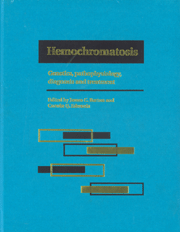Book contents
- Frontmatter
- Contents
- List of contributors
- Foreword
- Part I Introduction to hemochromatosis
- Part II Genetics of hemochromatosis
- Part III Metal absorption and metabolism in hemochromatosis
- Part IV Diagnostic techniques for iron overload
- Part V Complications of iron overload
- Part VI Therapy of hemochromatosis and iron overload
- Part VII Infections and immunity in hemochromatosis
- Part VIII Hemochromatosis heterozygotes
- 39 The iron phenotype of hemochromatosis heterozygotes
- 40 Ascertainment of hemochromatosis heterozygosity
- 41 Disease risk in hereditary hemochromatosis heterozygotes
- Part IX Relationship of hemochromatosis to other disorders
- Part X Animal models of hemochromatosis and iron overload
- Part XI Screening for hemochromatosis
- Part XII Hemochromatosis: societal and ethical issues
- Part XIII Final issues
- Index
41 - Disease risk in hereditary hemochromatosis heterozygotes
from Part VIII - Hemochromatosis heterozygotes
Published online by Cambridge University Press: 05 August 2011
- Frontmatter
- Contents
- List of contributors
- Foreword
- Part I Introduction to hemochromatosis
- Part II Genetics of hemochromatosis
- Part III Metal absorption and metabolism in hemochromatosis
- Part IV Diagnostic techniques for iron overload
- Part V Complications of iron overload
- Part VI Therapy of hemochromatosis and iron overload
- Part VII Infections and immunity in hemochromatosis
- Part VIII Hemochromatosis heterozygotes
- 39 The iron phenotype of hemochromatosis heterozygotes
- 40 Ascertainment of hemochromatosis heterozygosity
- 41 Disease risk in hereditary hemochromatosis heterozygotes
- Part IX Relationship of hemochromatosis to other disorders
- Part X Animal models of hemochromatosis and iron overload
- Part XI Screening for hemochromatosis
- Part XII Hemochromatosis: societal and ethical issues
- Part XIII Final issues
- Index
Summary
Introduction
The fitness of heterozygotes with recessive inborn errors of metabolism has been the subject of debate ever since Haldane first hypothesized that the fixation of these genes at high frequency in human populations must be due to some selective advantage of heterozygosity. The field of evolutionary genetics is firmly divided between those who believe this theory and continue (sometimes in vain) to find evidence for it, those who find apparent risk of disease in heterozygotes of most recessive disorders, and those who believe that the prevalence of heterozygosity observed is a laboratory artifact of little evolutionary significance. It has, for instance, been hypothesized that females heterozygous for hemochromatosis gene(s) are able to maintain a higher hemoglobin concentration during pregnancy and therefore have healthier babies. One of the more interesting dichotomies in this area of debate is that heterozygotes for mutations that cause phenylketonuria have lower intelligence than persons in the general population, but mothers of phenylketonuria homozygotes have larger families than persons who do not carry the phenylketonuria mutation. Other recessive disorders cause serious illness in heterozygotes, e.g., homocystinuria, ornithine transcarbamylase deficiency and Fabry disease. It has been proposed that an ‘… appreciable fraction of “multifactorial” genetic liabilities for common … disease might simply be due to heterozygosity for genes whose homozygous effects are already well known’.
Disease risk in hemochromatosis heterozygotes
Interest in disease risk in hemochromatosis heterozygotes arose from several perspectives. First, several investigators have found that hemochromatosis heterozygotes in well well-characterized groups have higher iron stores than persons without hemochromatosis genes.
- Type
- Chapter
- Information
- HemochromatosisGenetics, Pathophysiology, Diagnosis and Treatment, pp. 427 - 432Publisher: Cambridge University PressPrint publication year: 2000
- 1
- Cited by



